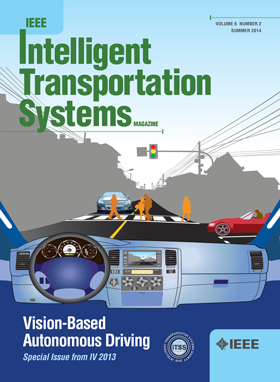Vulnerability Mitigation of Urban Traffic Control Against Cyberattacks Using Secure Multi-Party Computation
IF 7.9
1区 工程技术
Q1 ENGINEERING, CIVIL
IEEE Transactions on Intelligent Transportation Systems
Pub Date : 2025-02-18
DOI:10.1109/TITS.2025.3538095
引用次数: 0
Abstract
Traffic signal control systems are essential for safe and efficient urban traffic management. However, these systems increasingly rely on collecting and processing extensive data, posing confidentiality challenges that must be addressed to protect sensitive information and safeguard against cyber-threats. This article proposes a privacy-preserving traffic signal control strategy based on secure multi-party computation. The design uses multiple computing servers and a secret sharing scheme to encrypt traffic data into several shares, each corresponding to a server. The servers then securely compute the green time plans, working directly on the encrypted data. The proposed method protects traffic data from curious computing servers and external eavesdroppers, preventing the adversaries from gaining the required information to launch a complex attack. Additionally, a detection and recovery procedure from false data injection attacks on green time signals is presented using secret reconstruction from different server combinations. Simulation results for various scenarios demonstrate the proposed method’s effectiveness in maintaining data confidentiality while achieving the same performance as an unprotected control strategy, with a reasonable addition to computation time. It also depicts a significant reduction in vulnerability against falsified green time signal attacks in terms of total travel time in the network.基于安全多方计算的城市交通控制网络攻击漏洞缓解
交通信号控制系统是安全、高效的城市交通管理的基础。然而,这些系统越来越依赖于收集和处理大量数据,提出了必须解决的机密性挑战,以保护敏感信息并防范网络威胁。提出了一种基于安全多方计算的保密性交通信号控制策略。该设计使用多个计算服务器和一个秘密共享方案,将流量数据加密成多个共享,每个共享对应一个服务器。然后,服务器安全地计算绿色时间计划,直接处理加密数据。该方法保护流量数据不受好奇的计算服务器和外部窃听者的攻击,防止攻击者获得所需的信息来发动复杂的攻击。此外,提出了一种利用不同服务器组合的秘密重构来检测和恢复绿时信号的假数据注入攻击的方法。各种场景的仿真结果表明,所提出的方法在保持数据机密性方面是有效的,同时实现了与未受保护的控制策略相同的性能,并且合理地增加了计算时间。它还描述了就网络中的总旅行时间而言,对伪造绿色时间信号攻击的脆弱性的显着减少。
本文章由计算机程序翻译,如有差异,请以英文原文为准。
求助全文
约1分钟内获得全文
求助全文
来源期刊

IEEE Transactions on Intelligent Transportation Systems
工程技术-工程:电子与电气
CiteScore
14.80
自引率
12.90%
发文量
1872
审稿时长
7.5 months
期刊介绍:
The theoretical, experimental and operational aspects of electrical and electronics engineering and information technologies as applied to Intelligent Transportation Systems (ITS). Intelligent Transportation Systems are defined as those systems utilizing synergistic technologies and systems engineering concepts to develop and improve transportation systems of all kinds. The scope of this interdisciplinary activity includes the promotion, consolidation and coordination of ITS technical activities among IEEE entities, and providing a focus for cooperative activities, both internally and externally.
 求助内容:
求助内容: 应助结果提醒方式:
应助结果提醒方式:


